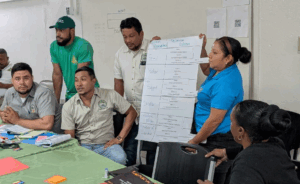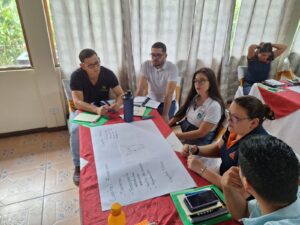Following the successful LEGS Training of Trainers (ToT) held in Panama earlier this year, new LEGS Core Trainings have been rolled out across Central America – marking a significant milestone for the region’s growing network of trained and accredited facilitators.
In June 2025, newly accredited trainers from the Panama ToT delivered the first-ever LEGS trainings in Belize, alongside two further courses in Costa Rica. These courses demonstrate how the new cadre of trainers is actively cascading the LEGS approach at a national level, strengthening capacity to plan and implement livestock-based emergency responses that protect livelihoods and animal welfare.
First LEGS trainings in Belize

© Giannie A. Vasquez
Two LEGS Core Trainings were held in Belize from 24-27 June 2025, organized by Brooke in collaboration with the National Emergency Management Organization (NEMO) and the Ministry of Agriculture, Food Security and Enterprise (MAFSE). The sessions took place in Central Farm (Cayo District) and Belize City.
The courses brought together a total of 36 participants (30 men and 9 women) from government agencies, emergency services, and the livestock sector. Participants highlighted the relevance of the training to their disaster response work, particularly for integrating livestock into emergency preparedness and recovery planning. As one participant noted, “This training was very practical to Belize, and should be used in real-life situations as we face many challenges in the livestock sector due to climate change.”
Feedback was overwhelmingly positive, with calls for longer sessions, more case studies, and additional hands-on exercises – reflecting strong enthusiasm to embed the LEGS approach into national emergency systems.
Strengthening capacity in Costa Rica

© Sandra Saborio Pérez
In Costa Rica, two further LEGS Core Trainings took place in Golfito (Puntarenas) and Liberia (Guanacaste), led by LEGS Trainers from Costa Rica’s National Animal Health Service (SENASA) and the National Emergency Commission (CNE), in coordination with CEPREDENAC and Brooke. A total of 29 participants (20 men and 9 women) attended, representing diverse institutions from the agriculture, environment, and emergency response sectors.
Participants emphasised the value of the participatory, hands-on methodology and its direct application to national emergency frameworks. Many commented that the training had helped them “understand the importance of livestock within emergency committees” and would “reinforce preparedness and response processes.” Suggestions for future sessions included additional local examples and practical exercises tailored to Costa Rican contexts.
A growing regional network
A total of 11 LEGS Core Training courses have now been delivered across the Latin America and Caribbean region this year. The most recent trainings in Belize and Costa Rica – following earlier courses in Colombia, the Dominican Republic, El Salvador, and Panama – highlight the growing regional reach of LEGS across Latin America and the Caribbean. Graduates from the Panama ToT are now putting their accreditation into practice, supporting national-level preparedness and ensuring that livestock keepers’ needs are addressed in humanitarian response and recovery.
These developments mark an important step toward a stronger, regionally coordinated approach to livestock emergency management – ensuring that when crises strike, both people and their animals are better protected.

